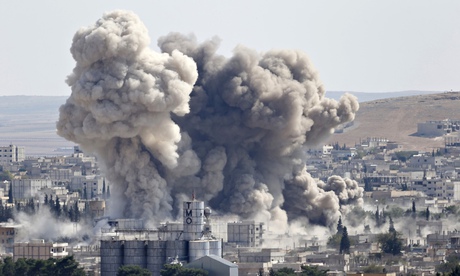
Syrian government forces are pursuing their war on rebels seeking the overthrow of president Bashar al-Assad and are barely affected by the US-led air campaign against the Islamic State (Isis), now focused on the embattled town of Kobani on the northern border with Turkey.
Analysts and diplomats in Syria and abroad say government air raids – including deadly barrel bombings – have claimed scores of lives in the two weeks since the coalition air strikes began. In some areas government attacks have intensified – as have rebel operations.
But the Syrian president’s ability to continue to attack his enemies without interference is fuelling anger amongst mainstream opposition supporters. “Syrian warplanes used to shell us two or three times a week but now they target us every day thanks to the coalition forces,” Faris Samir, from Harm in the northern Idlib region, complained on Thursday.
“We are losing martyrs and many get injured but no one pays any attention. Now the Syrian army is taking areas bombed by the coalition forces after the Islamic factions withdraw. I have to say that the coalition military campaign is in the interest of the Syrian regime and against the Syrian people.”
Overall, however, the strategic picture has hardly changed. The only significant government advance has been north of Aleppo. In the Homs area, coalition strikes hit Isis positions but government forces were unable to take advantage.
“In no case has a coalition air strike helped government forces,” Alaa Ibrahim, a Syrian commentator, told the Guardian. “But there has not been any hindrance to government attacks on rebels either.” Damascus, emphasising its “war on terror” narrative, has indicated that it is happy with the anti-Isis offensive and done nothing to interfere with it.
No coalition strikes have been made to help or relieve rebel forces where they were facing either Isis or government troops. Emile Hokayem of the International Institute of Strategic Studies said Assad has been able “to give his troops a break while surveying the landscape and looking for opportunities.”
Officials of the Free Syrian Army (FSA), the main western-backed rebel grouping – supposed to form the nucleus of a new, more effective US-backed fighting force – protest that there is no coordination with them. ”Our supporters could be the coalition’s eyes and ears on the ground,” said one. “US strikes are being unproductive, hitting empty buildings or killing civilians. That’s why there has been such anti-strike sentiment building up inside Syria. People can’t believe that all this attention is being paid to Isis when they see Assad as the biggest terrorist.”
Coalition hits on grain silos and a gas plant in Manbij and Deir al-Zor drew warnings of a humanitarian disaster – and the risk of playing into Isis’s hands, as shortages during the winter will be blamed on the international community. The Hazm movement – backed by the US and supplied with advanced anti-tank weapons – publicly denounced the intervention but was quickly silenced by Washington, rebel sources say. Attacks on Jabhat al Nusra (another al-Qaida-linked jihadi group and a rival to Isis) have backfired, and are said to have brought it new recruits.
Civilian deaths caused by coalition attacks clearly risk a backlash. “We had 10 martyrs when they targeted Al-Riqa,” said Zeid Al-Jabli, a student from Zawiya in the Idlib area. “There had been a base for Jabhat al-Nusra but they pulled out a long time ago and the civilians were killed instead. Shelling by the regime has intensified because of the coalition. We have martyrs and wounded every day.”
Mustafa Ahmed, also from the Idlib region, agreed :”I believe that the coalition’s intervention is in support of the regime. Now we have new displaced people created by the coalition.”
Yet few believe that Assad will benefit in the long run from the anti-Isis offensive. ”He does not have the human resources to go back to occupy areas where Isis has retreated,” said Monzer Akbik, a spokesman for the Syrian Opposition Coalition.
“It’s not so much that Assad is taking advantage of the strikes themselves, but that his forces have been able to continue carrying out air strikes of their own despite coalition aircraft occupying their airspace,” argued Charles Lister of the Brookings Doha Centre. “Isis has been an isolated force within the wider Syrian conflict dynamic for so long that strikes focused on their positions have not significantly affected any one side, as yet.”
Politically, it is a different story. “It is undeniable that Assad benefits in many ways from the anti-Isis campaign,” said Hokayem. “His own attacks and atrocities have received less attention. He cultivates ambiguity about coordination with the international coalition and benefits from the disarray and frustration among rebel forces and their sympathisers; the defection of some rebel units to Isis helps him portray all rebels as extremists.
“Obama said a few weeks ago that the US had no strategy yet to fight Isis. It seems there is still no strategy because the Syria component is missing. The US has adopted a narrow, counter-terrorism approach that is flawed and counter-productive, and has time after time ignored and denigrated its potential Syrian allies.”

No comments:
Post a Comment